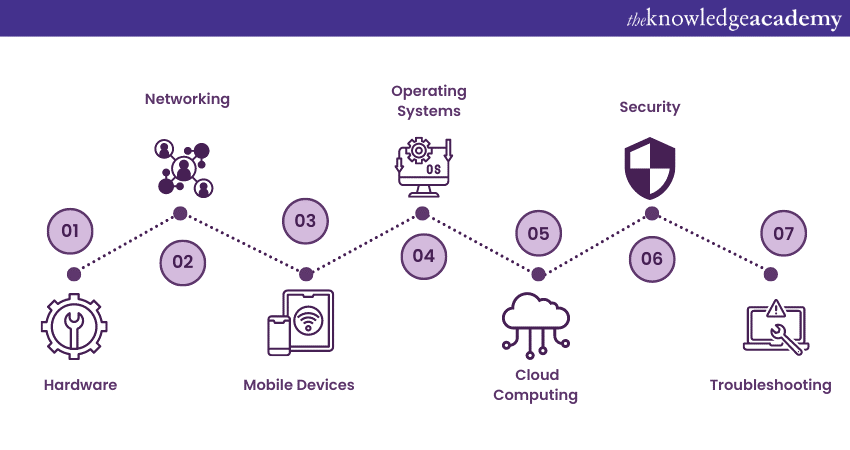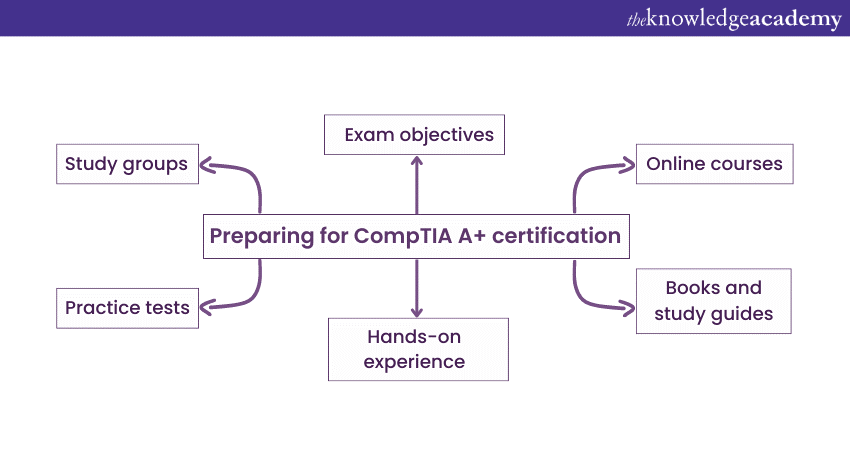We may not have the course you’re looking for. If you enquire or give us a call on +1 7204454674 and speak to our training experts, we may still be able to help with your training requirements.
Training Outcomes Within Your Budget!
We ensure quality, budget-alignment, and timely delivery by our expert instructors.

Aspirants willing to succeed in the Information Technology (IT) Industry often resort to acquiring CompTIA Certifications due to CompTIA’s popularity and trustworthiness. However, they often get confused among the many Certification options available in the market, particularly those new to the industry. This is where CompTIA A+ Certification comes in.
Often depicted as the industry standard that has helped launch many IT careers, CompTIA A+ has become a popular Certification for prospective job seekers worldwide.
Thus, it’s time to eliminate the confusion and learn about CompTIA’s A+ Certification. Read this blog to learn in detail about the CompTIA A+ Certification, who it is for and what career prospects you can expect upon completion of the Certification.
Table of Contents
1) What is a CompTIA A+ Certification?
2) Benefits of CompTIA A+ Certification
3) Topics included in CompTIA A+ Certification exam
4) Ways to prepare for the CompTIA A+ Certification exam
5) CompTIA A+ Certification Salary and career prospects
6) Conclusion
What is a CompTIA A+ Certification?
CompTIA A+ is a Certification that verifies the foundational knowledge and skills of individuals in the IT industry. It is designed to measure the proficiency of entry-level technicians in areas such as hardware, software, networking and security. The Certification is vendor-neutral, meaning it does not focus on any specific technology or platform but provides a broad understanding of computing fundamentals.
To obtain the CompTIA A+ Certification, aspirants are required to pass two exams: Core 1 or 1001 and Core 2 or 1002. These exams cover various topics under the broad categories of hardware, software and cloud networking. By earning this Certification, individuals can demonstrate that they possess the necessary skills and knowledge to perform tasks such as:
a) Installing
b) Configuring and maintaining computers
c) Providing technical support
d) Troubleshooting software
Since CompTIA A+ Certification validates the technical competence of individuals in the IT industry, it is highly valued by employers and is recognised globally.
Passing score of CompTIA A+ exam
In order to gain a CompTIA A+ Certification, candidates are required to pass an exam. The passing score for the CompTIA A+ exam depends on the specific version they are competing for. The CompTIA A+ 1001 exam requires a passing score of 675, while the CompTIA A+ 1002 exam has a passing score of 700. Both exams must be completed to pass the CompTIA A+ exam.
Benefits of CompTIA A+ Certification
From increased career opportunities to enhanced skills, obtaining a CompTIA A+ Certification has a lot of benefits. Let's take a look at some of them below:
a) Career versatility: A CompTIA A+ Certification opens doors to various IT roles. It includes Technical Support Specialists, Help Desk Technician, and more. This broadens your career options and enhances your employability.
b) Global recognition: This Certification is recognised worldwide. It underlines its importance in validating essential IT skills and knowledge on a global scale. It ensures your expertise is respected globally.
c) Diverse expertise: Passing the A+ exams demonstrate your proficiency in multiple IT domains. These include hardware, software, Operating Systems (OSs), and networking. This extensive skillset equips you to address a wide range of IT challenges.
d) Remote work flexibility: A notable feature of this Certification is the flexibility it offers for remote work. It allows you to choose your work environment. This flexibility is particularly valuable in an era of remote work.
e) Increased earnings: Certified professionals often earn more than their non-certified peers in entry-level IT positions. This provides a substantial return on investment. It also serves as an incentive for career advancement.
f) Professional development: Preparing for this Certification imparts valuable knowledge and skills. This foundational knowledge forms a strong basis for pursuing more advanced IT Certifications. This can help propel your career.
g) Problem-solving skills: This Certification sharpens your troubleshooting and problem-solving abilities. It improves your proficiency in addressing technical issues. This is particularly valuable in IT support roles.
h) Trust from clients and employers: This Certification instils confidence in your ability to deliver high-quality IT services. Trust and reliability are critical attributes in the IT industry which can be gained after acquiring this Certification.
i) Networking opportunities: The CompTIA A+ Certification provides access to professional networks within the IT industry. It enables you to connect with like-minded professionals for collaboration and career advancement.
j) Sense of achievement: Earning the A+ Certification is a significant accomplishment. It boosts self-confidence and motivates you to set and achieve higher career goals.
k) Vendor neutrality: Unlike certifications tied to specific vendors, A+ Certification is vendor-neutral. It ensures your skills and knowledge are adaptable to various IT environments.
Overall, CompTIA A+ certification equips you with a range of benefits that extend beyond its foundational role. It enhances your career prospects, increases your earning potential, and provides essential skills and recognition. This certification serves as the foundation for a prosperous IT career.
Elevate your IT expertise with our CompTIA A+ Certification Course – sign up now!
Topics included in the CompTIA A+ Certification exam

As mentioned above, candidates seeking to acquire this Certification must appear for an examination. The CompTIA A+ Certification exam covers a wide range of topicsand they can be categorised based on the exam you pursue. Let’s explore them below:
Domains for exam 220-1001
Let’s explore the key topics and domains included in the 220-1001 exam:
1) Mobile devices: This includes knowledge of mobile device hardware, such as smartphones and tablets, and mobile Operating Systems, like Android and iOS. It also covers mobile device security, troubleshooting, and configuration.
2) Networking: This covers the fundamentals of networking techniques and technologies such as TCP/IP, Ethernet, Wi-Fi etc. It also covers installing, configuring, and troubleshooting network devices such as routers, switches, and firewalls.
3) Hardware: It gives you detailed knowledge of computer components such as processors, motherboards, RAM, hard drives, power supplies, and peripherals. It also covers the installation, configuration, and troubleshooting of these components.
4) Virtualisation and Cloud Computing: This includes knowledge of virtualisation technologies such as virtual networks and machines. It also covers the basics of Cloud Computing and Cloud-based services.
Domains for exam 220-1002
Let’s explore the key topics and domains included in the 220-1002 exam:
1) Operating Systems: This includes knowledge of OSs such as Windows, MacOS, and Linux. Additionally, it covers installation, configuration and troubleshooting of these Operating Systems, as well as basic knowledge of Command Line Interfaces (CLI) and system utilities.
2) Security: This covers basic knowledge of security concepts such as access control, encryption, and firewalls. It also covers malware protection, network security, and data backup and recovery.
3) Software troubleshooting: This covers general troubleshooting methodologies, including identifying and solving common software problems and bugs.
4) Operational procedures: This topic covers the basics of important procedures like safety and sustainability and industrial best practices.
Ready to take your IT career to unprecedented heights? Register for our CompTIA Certification Training now!
Ways to prepare for the CompTIA A+ Certification exam

Preparing for the CompTIA A+ Certification exam can be challenging. However, several ways can assist you during your preparation journey and increase your chances of success. Here are some ways that can come to your help when preparing for the CompTIA A+ Certification:
a) Exam objectives: The first step in preparing for A+ Certification is to review the exam objectives. The exam objectives outline the topics covered in the exam and the percentage of questions dedicated to each topic. Use them as a guide to plan your preparation strategy.
b) Online courses: Many online courses cover the CompTIA A+ Certification topics and can be taken at your own pace. These courses provide a structured approach to preparing for the exam.
c) Books and study guides: Reading books and study guides can help you get a comprehensive understanding of concepts and topics covered in the examination. These resources often include practice questions and explanations of complex concepts, helping you understand the material.
d) Hands-on experience: Hands-on experience with the hardware and software covered in the exam is essential to prepare for the CompTIA A+ Certification. Setting up a virtual laboratory or practising on actual devices can help you gain invaluable practical experience.
e) Practice tests: Practice tests are an excellent way to assess your knowledge and identify areas of improvement. They help simulate the examination experience and become familiar with the format and types of questions.
f) Study groups: Joining study groups can help open new avenues of learning. Study groups can provide additional support and resources to help you prepare for the exam. They can also help you gain different perspectives from others and gain new insights into the material.
Understand more about cybersecurity threat management and how to use tools to handle cybersecurity threats with CompTIA CySA+ Certification Training!
CompTIA A+ Certification Salary and career prospects
Now, let’s discuss about various employment opportunities aspirants can expect after completing the CompTIA A+ questions and answers. You will also get an insight into the average salary you can earn in these roles. So, let’s have a detailed look:
|
Location |
Helpdesk Technician |
Tech Support Specialist |
Network Technician |
Associate Network Engineer |
Cybersecurity Manager |
|
UK |
£24,100 |
£31,200 |
£30,200 |
£33,300 |
£64,660 |
|
US |
$35,000 |
$40,000 |
$45,000 |
$50,000 |
$70,000 |
|
India |
₹25,000 |
₹30,000 |
₹35,000 |
₹40,000 |
₹55,000 |
|
Canada |
40,000 CAD |
$45,000 CAD |
$50,000 CAD |
$55,000 CAD |
$75,000 CAD |
|
Australia |
50,000 AUD |
55,000 AUD |
60,000 AUD |
65,000 AUD |
85,000 AUD |
|
UAE |
AED 100,000 |
AED 120,000 |
AED 140,000 |
AED 160,000 |
AED 200,000 |
|
Singapore |
SGD 50,000 |
SGD 60,000 |
SGD 70,000 |
SGD 80,000 |
SGD 100,000 |
Source: Glassdoor
1) Helpdesk Technician: They serve as mediums for users who require assistance in IT services for their daily operations. Therefore, the IT Helpdesk plays a vital role in the IT department. The average salary of a Helpdesk Technician can be rounded up to £24,100.
2) Tech Support Specialist: The importance of Tech Support Specialists has increased due to the advent of digital transformation across industries. They help resolve technical issues across various functionalities related to IT. They are involved in troubleshooting applications and deploying routine security checks. The average salary of a Tech Support Specialist is roughly £31,200.
3) Network Technician: Commonly referred to as Field Service Technicians, they work closely with on-site end users, ensuring that data networks are flowing smoothly. This is one of the best roles an aspirant can pick after certification. The average salary of a Network Technician is £30,200.
4) Associate Network Engineer: Network Engineers or Architects are responsible for managing and monitoring an organisation's network infrastructure. With the Comptia A+ vs network+ engineering market on the rise, this has become a lucrative entry-level job among CompTIA A+ aspirants. The average salary of an Associate Network Engineer is £33,300.
5) Cybersecurity Manager: There has been a significant increase in the need for Cybersecurity after the pandemic because of the increase in cyber-attacks. Cybersecurity Managers focus on using security tools to tackle noticeable threats. They have become a key part of an organisation looking to digitalise their processes. The average salary of a Cybersecurity Manager is £64,660.
Conclusion
Summing up, we have discussed in detail What is CompTIA A+, what the Certification entails, and what career prospects are waiting for aspirants looking to complete CompTIA A+.
With the advent of digital transformation, the demand for trained technical workers worldwide is rising quickly. A CompTIA A+ Certification can lead to a variety of chances for prospective career seekers in the IT sector.
Gain in-depth knowledge of the business side of Cloud Computing and the principles involved in the Cloud with our CompTIA Cloud Essentials+ Certification Course.
Frequently Asked Questions
Upcoming IT Infrastructure & Networking Resources Batches & Dates
Date
 CompTIA A+ Course
CompTIA A+ Course
Mon 30th Sep 2024
Mon 28th Oct 2024
Tue 12th Nov 2024
Mon 13th Jan 2025
Mon 10th Mar 2025
Mon 19th May 2025
Mon 21st Jul 2025
Mon 15th Sep 2025
Mon 17th Nov 2025
Mon 15th Dec 2025







 Top Rated Course
Top Rated Course.png)



 If you wish to make any changes to your course, please
If you wish to make any changes to your course, please


